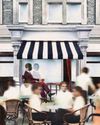
On August 7, 2022, Shantise Summers arrived home from a night out with friends around 2:40 a.m. As she walked from her car toward her apartment in Oxon Hill, a Maryland neighborhood just southeast of Washington, D.C., she heard footsteps behind her. She turned and saw two men in ski masks. One put a gun to her face; she could feel the metal pressing against her chin. He demanded her phone, wallet, keys, and Apple Watch. She quickly handed them over, and they drove off in her 2019 Honda Accord.
She called the police, and later that morning, a patrol officer spotted her Accord with several teenage boys in it. When the officer approached, the teens fled. As they sped down Alabama Avenue, in Southeast D.C., they collided with a city bus, then crashed into a pole. One was seriously injured. Two of the teens had been arrested for armed carjacking eight months earlier; one was still on probation. This was in keeping with what police had been regularly seeing: the same perpetrators arrested for carjackings again and again, even after getting caught.
Summers took three days off from work. She kept thinking about the feel of the gun on her skin, the way those seconds had stretched on interminably, the terror of believing that she would leave her children motherless. She was too scared to sleep at night, and afraid to leave her apartment. In need of groceries, she finally forced herself to walk to Safeway. "Every teenage African American male I saw, I'd freeze up," Summers, who is Black, told me. "I was standing in the middle of the store crying and shaking." Now her fear was overlaid with guilt. Here she was, a Black woman who considered herself progressive, stereotyping young Black men as threats.
This story is from the {{IssueName}} edition of {{MagazineName}}.
Start your 7-day Magzter GOLD free trial to access thousands of curated premium stories, and 9,000+ magazines and newspapers.
Already a subscriber ? Sign In
This story is from the {{IssueName}} edition of {{MagazineName}}.
Start your 7-day Magzter GOLD free trial to access thousands of curated premium stories, and 9,000+ magazines and newspapers.
Already a subscriber? Sign In

You Are Going to Die - Oliver Burkeman has become an unlikely self-help guru by reminding everyone of their mortality.
"The average human lifespan," Oliver Burkeman begins his 2021 megabest seller, Four Thousand Weeks: Time Management for Mortals, "is absurdly, terrifyingly, insultingly short." In that relatively brief period, he does not want you to maximize your output at work or optimize your leisure activities for supreme enjoyment. He does not want you to wake up at 5 a.m. or block out your schedule in a strictly labeled timeline.

Washington's Nightmare - Donald Trump is the tyrant the first president feared.
Last November, during a symposium at Mount Vernon on democracy, John Kelly, the retired Marine Corps general who served as Donald Trump's second chief of staff, spoke about George Washington's historic accomplishments— his leadership and victory in the Revolutionary War, his vision of what an American president should be. And then Kelly offered a simple, three-word summary of Washington's most important contribution to the nation he liberated.

The Elite College Students Who Can't Read Books - To read a book in college, it helps to have read a book in high school.
Nicholas Dames has taught Literature Humanities, Columbia University's required greatbooks course, since 1988. He loves the job, but it has changed. Over the past decade, students have become overwhelmed by the reading, College kids have never read everything they're assigned, of course, but this feels different. Dames's students now seem bewildered by the thought of finishing multiple books a semester. His colleagues have noticed the same problem.

What Zoya Sees
Long a fearless critic of Israeli society, since October 7 Zoya Cherkassky-Nnadi has made wrenching portraits of her nation's sufferingand become a target of protest.

Malcolm Gladwell, Meet Mark Zuckerberg
The writer’ insistence on ignoring the web is an even bigger blind spot today than it was when The Tipping Point came out.

Alan Hollinghurst's Lost England
In his new novel, the present isnt much better than the past—and its a lot less sexy.

Scent of a Man
In a new memoir, Al Pacino promises to reveal the person behind the actor. But is he holding something back?

CATCHING THE CARJACKERS
ON THE ROAD WITH AN ELITE POLICE UNIT AS IT COMBATS A CRIME WAVE

THE RIGHT-WING PLAN TO MAKE EVERYONE AN INFORMANT
In Texas and elsewhere, new laws and policies have encouraged neighbors to report neighbors to the government.

The Playwright in the Age of AI
In his new play, McNeal, Ayad Akhtar confronts, and subverts, the idea that artificial intelligence threatens human ingenuity.